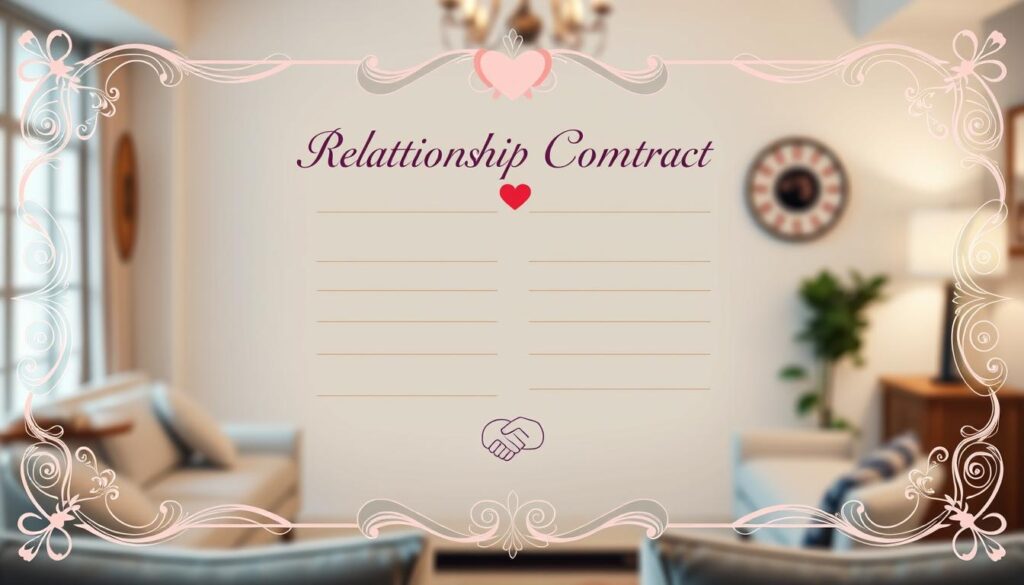In today’s world, more couples are using relationship contracts to make their bond stronger. A relationship contract is a document where partners outline their needs and how to solve problems. It’s not a legal contract but helps start honest talks about what each partner expects.
This contract can talk about many things like who does what, money, and time together. It helps you and your partner understand each other better. This leads to a more happy and lasting relationship.
Key Takeaways
- Relationship contracts are formal agreements between partners to outline shared expectations and responsibilities.
- These contracts can cover topics like exclusivity, finances, personal boundaries, and conflict resolution.
- Drafting a relationship contract can facilitate open communication and strengthen trust between partners.
- Revisiting the contract periodically allows couples to address changes and ensure the agreement remains relevant.
- Consulting legal professionals can help ensure the contract is enforceable and aligned with local laws.
Understanding Relationship Contracts and Their Purpose
Relationship contracts are not like prenuptial agreements or cohabitation agreements. They deal with the emotional and practical sides of being together. They help couples be honest, understand each other better, and talk more clearly.
What Makes a Relationship Contract Different from Legal Agreements
A relationship contract is not a strict legal deal. It’s a flexible plan that both partners agree on. It sets out what they expect from each other and what they want from their relationship.
Benefits of Creating a Relationship Contract
There are many good things about making a relationship contract. For example:
- It makes partners more honest with each other.
- It helps them know what the other needs and wants.
- It makes talking and solving problems easier.
- It gives a clear idea of what they both want from their relationship.
- It helps them make choices and solve problems together.
Key Elements of a Successful Agreement
A good relationship contract needs understanding, flexibility, and regular checks. It should talk about important things like how to communicate, money, personal space, and future plans.
By making a relationship contract, couples can trust each other more. They can feel closer and avoid problems later. Making and updating the contract helps them talk openly and strengthens their bond.
Essential Components of Your Relationship Contract
When you’re planning a marriage settlement, a premarital contract, or a cohabitation pact, there’s more than just legal stuff. You need open talks, clear money talks, and healthy limits. These are key for a strong, trusting bond with your partner.
Communication Guidelines and Expectations
Talking well is key in any good relationship. Your contract should say how you’ll talk, solve problems, and be honest. This way, fights are solved well, and both feel heard and understood.
Financial Arrangements and Responsibilities
Talking about money can be tricky. Your contract should cover how to split bills, who does the budget, and being open about money. This avoids fights and keeps your finances stable.
Personal Space and Boundaries
Having your own space is important. Your contract should talk about your alone time, private areas, and balance between doing things together and alone. This helps meet your need for freedom and togetherness.
A relationship contract isn’t about strict rules. It’s a guide for growing together. By covering these key points, you and your partner can build trust, respect, and commitment. These are the bases of a happy, lasting relationship.
| Relationship Contract Element | Purpose | Example Provisions |
|---|---|---|
| Communication Guidelines | Establish clear communication practices and conflict resolution strategies |
|
| Financial Arrangements | Promote financial transparency and shared responsibilities |
|
| Personal Space and Boundaries | Define individual needs and collective expectations for time and privacy |
|
“A relationship contract is not about rigid rules, but rather a framework for mutual understanding and growth.”
Building Trust Through Mutual Understanding
A relationship agreement, also known as a partnership contract or domestic contract, helps build trust. It lets you share your needs and desires openly. This way, you both understand each other better.
This understanding leads to respect for each other’s views. It makes your partnership strong and secure.
The relationship agreement helps you deal with disagreements. It sets clear expectations and duties. This way, you avoid misunderstandings and resentment.
Open talk builds trust. You both feel heard and understood. This is key to a happy partnership.
“67% of couples who regularly compromise report feeling happier in their relationships, compared to only 33% of couples who rarely or never compromise.” – Relationship Dynamics Study, 2023
Being willing to compromise is important. It shows you’re committed to your partnership. This makes your bond stronger and reduces stress.
Good relationship agreements make talking and working together easier. Tools like Contractbook help make your agreement clear and efficient. This strengthens your trust in each other.
In short, a well-made relationship agreement is great for trust. It helps you communicate openly, compromise, and work together. This leads to a more fulfilling and secure relationship.

Creating and Implementing Your Relationship Contract
Making a relationship contract is a great way to build trust with your partner. It’s a team effort that covers many important steps. You’ll talk about what to include and set clear rules.
Steps to Draft Your Agreement
- Have a real talk with your partner about your goals, limits, and what you expect.
- Figure out the main points you want to cover, like how to talk, money matters, and personal space.
- Together, write down your agreement in simple words. This shows what you both agree on.
Setting Clear Terms and Conditions
Your contract should have all the details about your partnership. This includes what happens if things go wrong or if you decide to end it. Clear rules help avoid any confusion about your promises to each other.
Review and Revision Process
Keeping your relationship healthy means checking and updating your contract often. Pick dates to look over the agreement and make changes as needed. This keeps your contract up-to-date and supports your relationship.
Signing your contract and keeping it handy is part of making it work. By creating and managing this agreement, you and your partner can build a strong bond of trust, communication, and understanding.

“Intentionality in relationships allows individuals to behave in ways that serve the relationship and support a predetermined intention.”
Maintaining Healthy Boundaries and Communication
A relationship contract is key for healthy boundaries and talking in your partnership. It sets clear expectations and preferences. This helps you and your partner talk about issues quickly and honestly.
This way, you avoid unspoken problems that can hurt your relationship. The contract reminds you of your promises to each other. It makes sure both of your needs are respected.
Regular talks based on the contract check your relationship’s health. You can make changes if needed. This way, you and your partner can respect each other’s needs better.
This leads to a more fulfilling and lasting connection. It makes your relationship more harmonious and understanding.


A Life-Changing Experience with This Weight Loss Supplement (Nagano Tonic)
I’ve always struggled with finding a weight loss solution that actually works for me. Like many, I’ve tried numerous diets, exercise routines, and supplements over the years—some worked for a short time, but nothing ever gave me long-term results. That was until I decided to try the weight loss supplement I found : Link to the Supplement.
From the moment I started using it, I noticed a difference. Not only did I feel more energized, but my cravings also became more manageable. The best part? I started seeing results much quicker than I anticipated! Over the course of just a few weeks, I noticed a significant reduction in belly fat and overall weight loss that I hadn’t been able to achieve before.
What makes this supplement stand out from all the others I’ve tried is how it supports me in my daily routine without any jitters or energy crashes. I’m able to stay focused and motivated, which has made it easier to stay on track with my diet and exercise plan.
This product truly exceeded my expectations, and I feel more confident and healthier than ever before. If you’re struggling with your weight loss journey like I was, I highly recommend giving this supplement a try. It’s been a game-changer for me, and I’m sure it can work wonders for you too!
Contant Them on email .. tonicnagano50@gmail.com
I’ve tried so many weight loss products over the years, but nothing worked like this supplement! Since I started using it, I’ve noticed a big difference in my energy levels and appetite control. In just a few weeks, I’ve lost weight and feel so much better. It’s been easy to stick with, and the results speak for themselves. Highly recommend this to anyone looking to make a real change!
I was skeptical at first, but this supplement has truly made a difference in my weight loss journey. I’ve lost weight without feeling deprived or sluggish. My cravings are under control, and I feel more confident in my body. It’s easy to incorporate into my daily routine, and the results speak for themselves. I’m so glad I gave it a try!
Thanks David, i do use the link to make my purchase. you can get too here http://surl.li/iasppy
I’ve tried so many weight loss products, but this one has been by far the most effective. In just a few weeks, I’ve noticed a visible difference in my body and energy levels. It’s helped me stay on track without the constant hunger pangs and cravings. I’m really happy with my progress and can’t wait to see where I’ll be in another month!
This Nagano Tonic has been amazing! In just a few weeks, I’ve lost weight, feel more energized, and my cravings are under control. Highly recommend it!
Thats the link to purchase http://surl.li/iasppy